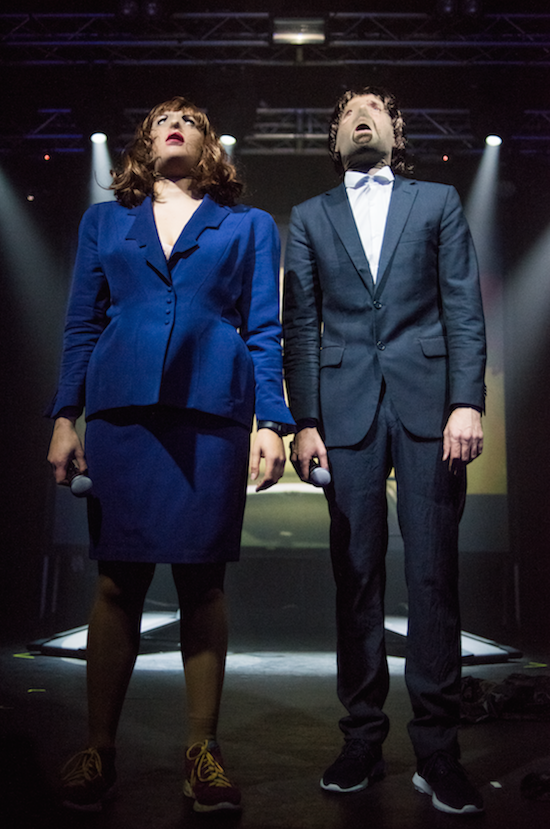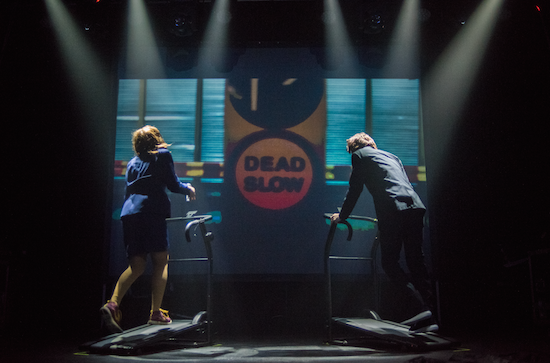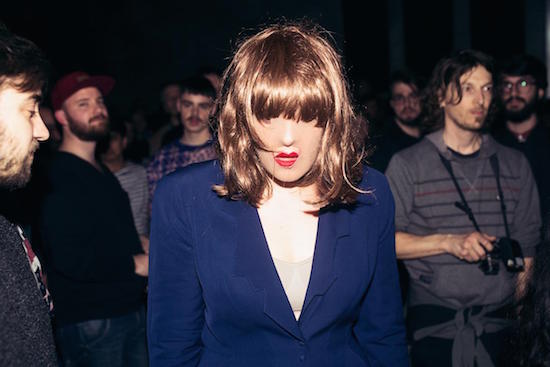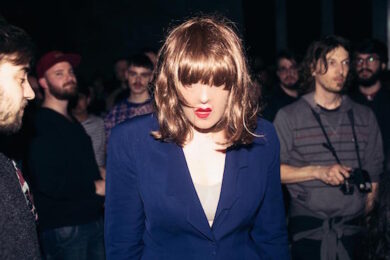The world is barely a month into 2017, and whilst global events seem to spiral at an intimidating rate towards an uncertain and alienating future, it’s hard not to imagine the cultural prophets of yesterday looking on, having warned of the dark clouds that have been gathering for the last half century over the landscape of late capitalism. Moreover, whilst George Orwell and Aldous Huxley have been cited with increasing regularity by contemporary commentators struggling to make sense of what’s unfolding, it’s hard not to also imagine the wryly smiling figure of J.G.Ballard watching as civilisation struggles to adapt to its latest set of self-inflicted challenges and its omnipresent animalistic urges.
“Watching the world slip into far right power, with corporate interests at the top, and people at the bottom, it is certainly a chilling time,” reflects Elizabeth Bernholz, whose Gazelle Twin is now explicitly tackling just the themes and psychic landscapes that Ballard explored, and joining the dots between those and an abstract interpretation of the here and now. Indeed, with Kingdom Come, the live show that she and her partner Jez Bernholz have based on Ballard’s last 2006 novel of the same name, she’s reached a point where the shifting identities, dystopian atmospheres and metaphysical mind-games she’s always explored with Gazelle Twin are transposed to still more intimidating frontiers.
“At school I had a short-lived passion for Mervyn Peake’s Gormenghast trilogy, and also found one of his short stories in a book called The Inner Landscapes which included The Voices of Time by Ballard and Danger: Religion! By Brian Aldiss,” remembers Berholz of her introduction to Ballard. “I then ate up Concrete Island, The Drowned World and The Crystal World which all inspired me for grand surrealist landscapes and sci-fi escapism, but more recently, the near-future, everyday scenarios like Crash, High-Rise, Millenium People and Kingdom Come made a more visceral impression on me. They feel anthropological in their insight and prescience.
“All of these books capture a sense of dread with the world, particularly the very deep human tendency towards tribalism and ultra violence,” she elaborates. “He unpicks the elements of it, the anatomy, and traces the ancient traits within us and how they keep on applying to the contemporary world. I really just like to get under the skin of those ideas, because they are bizarre, and uncomfortable.”
Bernholz notes that with Kingdom Come being Ballard’s last project, it was a presentation of the world he had encountered just before he died. "But I think he had already told the story before, and hinted at it in High-Rise and Millennium People, which are both as witty as they are serious," she adds. "Ballard knew these traits in us are vulnerable to the capitalist life and class-tribalism, but here I think he wanted to illustrate how much uglier things can and will become – the consumer consumed, as broadening suburbs and narrowing prejudices collide.”

First commissioned by Manchester’s FutureEverything festival, subsequently performed across Europe and currently on tour across Belgium and Germany for its final bow as we speak, Kingdom Come marks one particularly bold step in the lineage of Gazelle Twin – Elizabeth herself may have been responsible for the concept and the music, yet she plays no part in the actual performance itself. Observers of Gazelle Twin’s work, and admirers of the 2014 Quietus Album Of The Year Unflesh may not be entirely surprised by her subsuming her own image under a broader conceptual framework, yet this remains a step even they may not have predicted.
“That was always the plan with this show,” says Elizabeth. “For a while I had it in my head that I wanted to try something out with other people performing instead of me – taking the changing Gazelle Twin costume one step further and giving it to other bodies and other voices altogether. I have always seen Gazelle Twin as a kind of puppet for my ideas. It’s not a personal theme, it’s outward looking, so I think it needed some other elements to it to bring that across. My voice is still in there though, I’m kind of the narrator, the siren of the shopping mall, perhaps.”
Moreover, there were practical concerns to be dealt with. “It was fantastic timing because I found out I was pregnant towards the end of the Unflesh tour in 2015 and knew I’d need to take at least a year off. So this way I could keep Gazelle Twin bubbling away and not have to be there in the flesh.”
FutureEverything 2016: Gazelle Twin – Kingdom Come – An audiovisual performance for two vocalists from FutureEverything on Vimeo.
Instead, vocalists Natalie Sharp (AKA The Lone Taxidermist) and Stuart Warwick become the ciphers for the vision, clad in a clash of power-dressing city-wear and gym get-up and carrying out a surreal and unnerving performance that sees them shorn of identity and undergoing a personal transformation to a visual accompaniment that throws the audience full-pelt into the chill of consumerism and the dehumanising suburban vistas of the novel. Moreover, in another somewhat unprecedented move, two treadmills form a central part of the show, as the two divide their energies between dispensing a fractured opera of ululations and guttural exhortations, and breaking to mount these machines, seemingly reduced to Duracell rabbits driven on an infinite pathway to nowhere in particular.
“In terms of this particular work of Ballard’s, we’ve got this commercial world of escalators, shopping malls, retail parks, city workers on a weekend, and with that I imagined these completely indistinguishable people, no real identity, no imagination, no freedom, existing on loop in ‘an intense, transactional present’ – to quote directly from the book. I think that’s what I am getting at with this show.
“Musically I wanted something that brought out the visual elements really deliberately – stainless steel temples, fluorescent lighting, polyester sweat, and nightmare looping treadmills – so I went for a kind of eerie, religious choral purity, with cold almost robot mantra chanting offset by a very deep, stomach churning energy eventually becoming a wild cacophony of grunts and screams – all in all it had to feel a bit like a ghost train. And I think it does. It’s frightening music to be honest. My little boy gestated to it over 9 months!”
In terms of how she came across her collaborators for this, it appears they suggested themselves. “I had met Natalie through Benge, and Phil Winter who are both in Wrangler. She is just such a striking and electric, beautiful character. She was very kind to me about Unflesh and very supportive of it. Jez and I went to see her perform, and she had this fierce energy and humour that I just thought would be absolutely perfect to perform this music, she also has an incredible set of lungs and fully does the vocal performance justice. And Stuart I had known way back when I lived in Brighton – before I started Gazelle Twin, I used to do quite a lot of acoustic gigs, and we often played the same shows. Stuart’s voice is really beautiful and pure, and he also has a super-dry, sometimes filthy wit – so I thought the combination was perfect for this show. And it is. The third performer, that often gets missed because he performs offstage, is Jez (Bernholz) – he runs all the sampling live with the films.”

Indeed, the concrete-centred setting, visions of grainy CCTV footage, increasingly surreal imagery and panoramas of a society approaching violent collapse in the visuals form another part of a powerful and disconcerting multi-sensory assault. “Chris Turner and Tash Tung are two filmmakers I was lucky enough to work with on Unflesh back in 2014. We all share an enthusiasm for the extreme and the uncanny. I think the things we discussed about this show were coming from quite diverse backgrounds, from horror film, to installation art. We were all really keen to expose the fear and dread in places that otherwise might not seem to have much to offer – carparks, brutalist estates, and shopping malls It’s worth pointing out that each film acts as a backdrop to the two performers on treadmills, so they’re not really standalone pieces. In a sense, we were going for a sort of virtual reality special effect to produce live, as simply as possible, which I think depending on venues, has really worked well. It’s pretty bizarre to witness two singers on treadmills, but somehow it really works with the motion of the film and the music.
“I suspect that Gazelle Twin is becoming a conceptual approach to performance now, not just a band name, not just a fixed identity," clarifies Elizabeth. “People don’t always get it of course, or like it, or want to move away from one aspect of it they like, as the music changes too, but stuff has to be shaken up, for me as much as the culture that gives it a platform. The anonymity is certainly part of that point, and I think if there’s one thing that unites all Gazelle Twin projects it’s the notion that there’s something transformative about someone in a mask or a costume – especially one that feels familiar, but warped at the same time, it’s an old idea. I harp on and on about Pagan cultures but it’s all the same. That’s the raw ingredients for everything I do really.”
Bernholz will be returning to Gazelle Twin action of a slightly more conventional stripe later this year, although on recent evidence all bets are off as to what part convention will play in the proceedings. What is more sure is that Kingdom Come sets an intimidating precedent for an artist still breaking through invisible performative barriers that the majority of those forging their way through the trials and travails of the contemporary everyday have scarcely begun to even acknowledge.
“Something tells me the dystopia as a theme will probably going to stick around for a while," she says. “After all there is endless mind fuel there, and we have to have an outlet for all the horror currently taking place don’t we?”
Kingdom Come will be presented at Berlin’s CTM Festival on February 3 and Munich’s Münchner Kammerspiele on February 4



